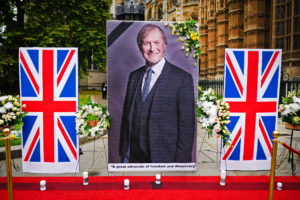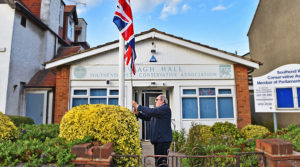Daddy Dragon’s Rally is in Warrior Square, Southend, opposite a blank-eyed Travelodge. It is a gathering of the English Constitution Party, which seeks secession from Britain, its oppressor, in support of its leader Daddy Dragon (or Graham Moore) in the Southend West by-election. This is a meeting of the alienated English, and it is desperate, tragic and gay. Before it starts, they blow a horn in the Viking style. They want to travel backwards through space, possibly to King Alfred’s time. They love flags. There is a St George’s flag, a royal arms of England flag with its golden lions, and even a red rose of Lancaster. You don’t see that very often these days.
This is where David Amess, the Tory MP, was killed last year at a constituency surgery. Due to this, Labour and the Liberal Democrats are not standing in the by-election today where they might, in other circumstances, have tried to dent the immense Tory majority. (Amess took 60% of the vote in 2019, in a Leave-supporting seat.) It wouldn’t happen though, and perhaps the opposition parties know that, and their politesse is also cynicism. If there is a Boris Johnson land it is here. This is Essex, the land of spurious self-confidence. Why else build a mile long pier into the mud of the Thames estuary, where no one wants to go? Because you can. The men of Essex have not lost their affection for Johnson because they are like him. When Johnson said “voting Tory would cause your wife to have bigger breasts and increase your chances of owning a BMW M3” — and it is, in retrospect, a very truthful manifesto, in that it is dreams — he was talking to Essex Man and the things he wanted and understood. And, so, when I ask people in Southend about Johnson and the parties, they either admire him or forgive him.
“I broke the [pandemic] rules,” says one man. “I saw my Mum. I wasn’t going to not see my Mum. The thing before the funeral [of Prince Philip]. That was a bit a naughty. God bless her.” But “Naughty” is an indulgence. It is not a critique. “I didn’t get caught but he did,” he says, “I don’t give a monkey’s.”
“There’s nothing wrong with Boris,” says another man, angry even at the insinuation that there might be. The only critical man is a fishmonger, and he only says, “Better the devil you know.” Fish are swimming in the estuary, he says, and customers are plentiful. Things are looking up.
I am looking for the parties to the right of the Conservatives. With Labour and the Liberal Democrats — and also the Greens and Reform — absent from Southend, they have the field to themselves. (The Conservative candidate, the barrister Anna Firth is, as is usual when defending a constituency in a by-election, so elusive as to effectively be a myth. I only email her campaign to exercise my finger joints.) You can learn a lot about what people think when you talk to what is called the far Right, because almost no one begins their political journey there. Something took them there. And sometimes, if you are unlucky, you can predict the future.
But not always. I meet Jason Pilley, the Psychedelic Movement candidate and party leader in the Utopia Coffee Shop off Southend’s main drag. He is wearing a pin-striped jacket. He was once a Green — “they hate each other,” he says, because he has no filter to speak of — and his candidacy is a piece of performance art, or scream. He speaks fast, like a man who is never listened to enough, and calls Southend, “heaven and hell. You can’t win in this town [as an MP] unless you are a Tory.” He says, “I’ve never gone into an election thinking I can win. There’s a couple I’ve thought: ‘I won’t come last’. I write novels and poetry and I kind of see politics as part of that.” He hands me his manifesto. He is for allotments and renewable energy and martial arts training for children and cannabis and LSD clubs “around Southend”. He would burn incense in all public buildings and would replace the Queen with the Christian stabbed at Speakers’ Corner last summer: Hatun Tash. He wants to make Tommy Robinson a peer. It ends: “RIP David Amess”.
As I read, he shouts at me because I criticised Tommy Robinson, and I have not read the Koran. Pilley is in politics for personal self-renewal, like the Corbynistas, and I leave wondering whether it is even responsible to interview him. He is very interesting, but he speaks for no one but himself. His policies are a collection of personal dreams, and prejudices, and I think he knows it.
I also speak to the English Democrat candidate Catherine Blaiklock by telephone because she is not in the constituency to campaign. I think she is too frightened. She lives in Norfolk, where she runs a B&B. Blaiklock left Ukip due to its links with Tommy Robinson under its former leader Gerald Batten. She co-founded the Brexit Party with Nigel Farage but left when Hope Not Hate publicised her anti-Muslim tweets. She has landed with the English Democrats. She sounds strained but pleased to be speaking to a journalist.
“Standing on an anti-immigration, anti-terrorism, anti-crime, Right-wing platform is a very unpleasant and nasty experience in Britain,” she says. “Anyone who has spoken out about illegal immigration has had to have protection and anyone who has spoken out illegal immigration and mass immigration has had their characters thrown through the mud”. She doxed herself, she says, by putting her address on public record and TripAdvisor customers posted fake reviews of her B&B. “Some of them were funny.” But it was hard to get them taken down, she says, which, when you consider the misery some migrants suffer, sounds slightly self-obsessed. Even so, “This should be a referendum about mass migration per se. Nobody has ever never had a vote on it. People are frightened and people are frightened to talk about it”. In her guesthouse, Blaiklock sounds as isolated as a woman can be.
I go to the Daddy Dragon rally, which is filled with people on mobility scooters wearing the bright yellow sweatshirts of the English Constitution Party and listening to a history of England, courtesy of Daddy at the microphone and the enormous copies of Magna Carta which travel with him. Some people are here merely because their friends are here. They sit calmly at the café drinking beer. There is even a 75th birthday party for an ex-soldier called Nobby bolted on to the rally. The groups combine, fall apart, combine again. Nobby shows me photographs of his father, who was also a soldier, and I see a vaccine appointment card gleaming in his wallet. Splitter.
But there are true believers too. “Even though you are English, living in England, you are not actually English living in England,” a man tells me. They are all hungry to be listened to, and courteous, because they are used to be being despised. “You are just a British citizen living in Britain which actually makes no sense because there are four countries in the United Kingdom,” he says. His eyes widen, as if in pain. “I’m not Scottish and I’m not from Wales and I’m not from Northern Ireland. Everyone else has their culture pushed to the front and we’re not even allowed to talk about it in case you offend someone who’s just come over.”
I also meet a man with two greyhounds who runs a group called Mad Mick’s Conspiracies — alongside his own splinter group Mad Mick’s Resistance — who calls Covid, “the PLANdemic. None of it is real.” Why does he feel failed by conventional politics?” It’s in the words,” he says, as if giving me the key to a great secret, “they tell you themselves. The Left-wing and the Right-wing are two wings of the same bird. So, it doesn’t matter which one you vote for. You’re still getting the same bird in power. I don’t vote. I will never vote again.”
“We’re the last indigenous group that doesn’t have a parliament,” says the next from his mobility scooter. “We just need to get England recognised as a country, to get us sorted out so we can get some stalwarts of the community in parliament: every day working people like Graham, myself, yourself, anybody.” What he says is not extraordinary. This is the common disconnect between those who have power, and those who feel they have none. But that he weeps continually as he says it is extraordinary. “The politicians are there for themselves,” he says through his tears. “You pull my strings. I’ll pull your strings. You just can’t warrant it. We need to get in, take our parliament back, get our people right and look after ourselves. And get rid of the mainstream politicians, the judges and get them starting thinking English again. Because there’s a lot of people who believe in England.” I don’t know if he is aware that he is calling for an end to parliamentary democracy, and it will not be as sunny as he thinks. If he is, he does it weeping.
At the end of the rally, Kay Shemirani, a former nurse, now struck off, speaks her combination of conspiracy theory and health advice. “They think you’re stupid,” she says. “We are the slaves, the slaves in debt. A whistle-blower right from the very top [of the NHS] told me, ‘They are doing black magic, they refer to us as toilet rolls’”. I have been here an hour, and it doesn’t even sound strange anymore. This is a parallel universe, though it shares some elements with mine. I believe in their powerlessness, and their grief. I just don’t think it was immigration that brought them here.
I also meet the remnants of Ukip, sullen and dispirited. They have erected a gazebo in a park and have placed Ukip mugs and Ukip badges on a table. Vote Leave says one badge. Take Back Control says another. This is a campaign from 2015, when they came third in the general election by percentage points with 12.6%, and they know it. Some of them are self-aware and ask me, privately, how the respectable element of Ukip can divorce itself from the racism I hear that day.
The Ukip candidate, Steve Laws, is slender and pitted. He was politicised by illegal immigration. He likes to stand at the edge of Channel in Folkestone, where he lives, making notes of the number of migrant boats in the English Channel: “8,500 in the year 2020; in the year 2021 it was 28,500. This year I am predicting at least 50-60,000 will arrive, all at the taxpayers’ expense and all placed into hotels and then into social housing”.
Laws is a painter and decorator. “I believe immigration should be controlled because otherwise it affects the working class and ultimately housing becomes an issue,” he says, “jobs become an issue, wages remain low.”
I have followed Ukip for years and I have never seen them so bereft. It is, among other things, an education in getting your heart’s desire. When I find Laws at the end of the day, and ask him how it went, he says, “Nobody had much to say, not the people we met today anyway. A lot of people I don’t think are going to vote. But we don’t know until the ballot day.” Even so, “I haven’t been shouted at or abused which I kind of expected if I’m honest, being Ukip.”
Laws is an aggrieved man spending his life staring at the Channel when the true cause of his misery is behind him. I think that about all of them except Pilley, who speaks only for himself. The issues Laws grapples with — failing public services, housing, wages, the gap between rich and poor, the sheer disconnect — are not invented or untrue. They are real and they will get worse. Laws is right about everything, it seems to me, except the solution. That is, he sees the crime scene clearly, but he has no idea who the murderer is.
It is easy to laugh at Laws and Daddy Dragon and Mad Mick. I have laughed. I went to Ukip conference in 2004 and laughed. All the correspondents did. We laughed at their clothing and their speech and their manners. We laughed at their earnestness. We laughed at their class. We laughed at how they didn’t know how to conceal themselves for us, and how they always got everything wrong. We printed the laughter in newspapers, and we congratulated ourselves on the quality of our satire, and assumed they existed for nothing other than our satire. You know, of course, what happened next.
Disclaimer
Some of the posts we share are controversial and we do not necessarily agree with them in the whole extend. Sometimes we agree with the content or part of it but we do not agree with the narration or language. Nevertheless we find them somehow interesting, valuable and/or informative or we share them, because we strongly believe in freedom of speech, free press and journalism. We strongly encourage you to have a critical approach to all the content, do your own research and analysis to build your own opinion.
We would be glad to have your feedback.
Source: UnHerd Read the original article here: https://unherd.com




